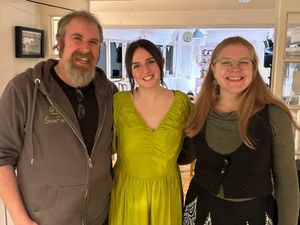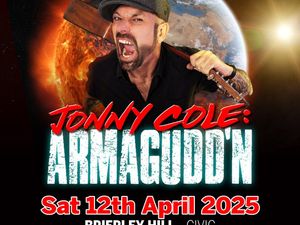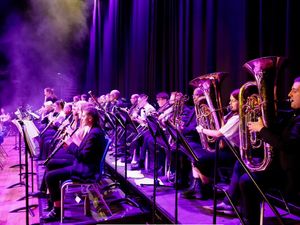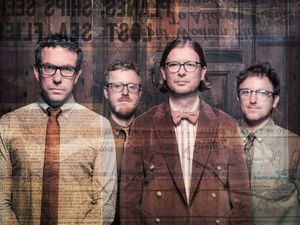Down to earth, but not down at heel: Will Young talks ahead of Birmingham show
He’s politeness itself. Will Young is a multiple Brit Award winner, a seller of millions of records, a man who earned an Olivier Award nomination for his role in Cabaret and has made a considerable humanitarian contribution as a philanthropist. And yet he might as well be the guy standing in the queue for the bus.
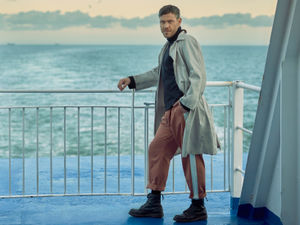
Down to earth, but not down at heel, Will exhibits neither arrogance nor ego. There’s not a trace of disingenuousness nor going through the motions. He’s engaged and alive, a vibrant and intelligent conversationalist who neither ducks nor dodges questions.
Nothing’s off limits. He engages with questions, rather than batting them away. Rational and level-headed, charming and smart, witty and with vast reserves of empathy and warmth, he’s everything one might hope him to be.
Will’s here to speak about his new album, Lexicon, though the conversation quickly moves on to other, more substantive matters. The record, his seventh, is out later this month and was produced by Richard X. Some might consider he has plenty to live up. After all, his previous studio albums have amassed a total of 12 platinum discs. But Will feels no weight of expectation; far from it.
“It’s been an absolute pleasure to work on it. It’s very soundscapey; it’s almost luxe pop.
“I’ve worked with Richard X before and thoroughly enjoyed that. Now I think this is my best record. The sounds on the record are fantastic. Richard’s very precise. So it’s lovely to be releasing an album that I feel has such quality in it. That’s all I can do, really; release something that I’m pleased with and might choose to listen to.”
Lexicon was written by Young and numerous other songwriters. He was keen not to relieve some of the pressure he might have felt had he burdened himself with writing the entire project.
“This time I didn’t want to do that much songwriting because I find it quite intense. So I took the pressure off by saying I’d write some songs and then asking loads of writers to write other songs for me. So there was a song from Eg White, who wrote Leave Right Now, as well as plenty from new writers. That meant the pressure was off.”
And, with no pressure on his shoulders, Young wrote like a dream. The first two singles from Lexicon, including All The Songs, were his own work.
“I enjoy writing myself but I also enjoy working with other songwriters because I quite like jumping into their stories.”
He’ll hit the road later this year, heading out on a UK tour this October. There’ll be a show at Birmingham’s Symphony Hall on October 4, though Young doesn’t plan to give too much away just yet.
“The tour will be really fun. It will be a show of two parts. I’ve just been working on the creative aspects of that, which I love. I’m interested in the musicians and about how I perform. Because I’ve done a lot of theatre, the shows are becoming more theatrical. I like that people don’t have to take the shows too seriously. Last time, I started with the finale, which I quite enjoyed. This show has two acts, so I can do a different creative work for both halves. I’m having a lot of laughs with it.”
There was a time when Young rarely took a day off, where the demands of his pop star career meant he worked around the clock. And that investment in his career paid off. His debut album, From Now On, was a double platinum record that went to number one. The follow-up, 2003’s Christmas smash Friday’s Child, also went to number one while notching up five platinum discs.
In 2005, Young earned three more platinum discs for Keep On while a further platinum record followed in 2008 for Let It Go. In 2011, he returned to number one with Echoes, which secured a further platinum disc. Young has been nothing if not consistent. And yet that stressful and dysfunctional era of over-work has long passed and these days Young works four days each week, conceptualising and executing a range of creative projects.
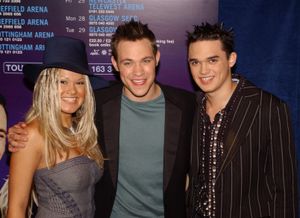
There are talks on mental health and a new book to write, following the success of his autobiography, the 2012 hit Funny Peculiar.
“I get loads of downtime. I make sure that I do. I work a four-day week and I make sure I have time to do other things. I’m doing the music for a musical drama with the director of The Greatest Showman. I’ve been doing that for three or four years. I’ve got lots of variation in what I do and that keeps everything exciting. That’s what I love about the job. I have a lot to do.”
He enjoys working on his next book, which has the working title How To Be A Gay Man. It’s semi-autobiographical and focuses on the gay shame that people feel when they are a minority group and are unjustly viewed by some as being just wrong. “The narrative explores how that creates internalised gay shame. I charter my experience of that and give reflections on it and also write about how I came out of that.”
From that, he wants to run courses for gay men. He’s worked with an exceptional therapist and is making rapid progress.
Young has enjoyed a remarkable career with huge success in the live arena, as a recording artist, as a writer and in the theatre. However, arguably the defining characteristic of his career has been his authenticity. From rowing with Simon Cowell during his reality TV days to walking off Strictly when he’d had enough, from keeping it real with fans and the media to maintaining his integrity when it would have been easier to do anything but. Young’s career has been built on grace and a sense of decency. To many, he’s a role model. He’s made life better for those suffering with mental health issues and made it easier for gay people to be themselves and live without oppression.
“I don’t reflect on that. What I try to do is be as authentic as possible. You know, when I do my mental health talks, I take myself out of it. I don’t go in with any intentions, I just try to share. I’ve found that that’s the best way to do them – it’s the best way to do music too. I don’t do talks like that for my ego. I do have an ego but when I do those talks it’s all about connecting with people.”
He’s a huge fan of the work that Princes Harry and William have done in elevating mental health issues onto the national agenda. He’s worked with Prince’s Trust for 17 years, has supported Oxfam and has worked with Mencap, gAID, Women’s Aid, The Children’s Society Safe and Sound Campaign, the Mood Foundation and Catch 22, a UK young people’s charity, which supports young people in tough situations.
“I think the Princes, and in particular Harry, have really got mental health issues onto the agenda. The way Harry did it was by being vulnerable and sharing his own experience. That gave other people permission to share their experience, which is a powerful thing to do. When you get people like Harry talking about it, and Harry is an incredible man, it really helps.
“He majorly put that on the media agenda. I don’t know how he did it. I guess because he’s so famous he made that explosion in interest happen. The media were all over it and it’s just astonishing. If people think that Royals, who are supposed to have everything, can also suffer, then they realise it’s normal and that really helps. If you get people in those places who appear to have everything saying they’re not happy, it legitimises unhappiness in others and that’s really important.”
Young knows all too well the importance of reaching out to others. After all, he suffered a major breakdown and was unsure whether or not he’d pull through.
“A breakdown can’t really be anything but excruciating. It’s like tearing muscles and you have to let them heal in the right way. I had so much pain. I honestly didn’t know if I was going to make it.”
Therapy and self-reflection got him back on track. “It was quite a quick recovery once I started therapy. But then I got very ill and that wasn’t really in the plan, but that’s what happened. That was more a physical illness. I was fortunate to have the time to recover. The path of life is never straight and those things always happen for a reason, even if that doesn’t feel like that at the time.”
Among the other causes close to Young’s heart is the campaign to stop animal cruelty. He is a long-time supporter of wildlife charities, including WWF. His single, What the World Needs Now, raised awareness and funds for declining wildlife populations around the world. It was prompted by a simple realisation, that during his lifetime global wildlife populations had declined by over 50% while forests and oceans remain at risk.
His rural background allied to a natural empathy are the reasons for his interest. “Growing up in the countryside, I’ve always been around animals and had a lot of them. I’ve also been lucky to travel around the world. I backpacked a lot through Africa and got a lot out of the nature when I was there.
“Preserving the planet and preserving animals’ lives is a serious thing. I think it’s great that things are being taken seriously. When you look at the amount of elephants being killed each year, it’s awful. How is that happening? How is that even happening? It’s awful that people are taking ivory or rhino horns because they think that will make them more proficient in the bedroom when that stuff is basically made up of hair. Don’t they realise that. They are basically grinding up hair. It’s so crazy.”
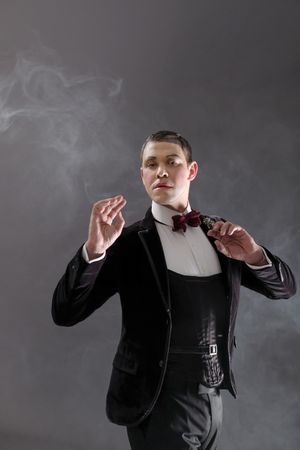
Remarkably, music wasn’t Young’s first choice of career. he was interested in sports and dreamed of competing in the Olympic Games in the 400-metre sprint, which he could run in under fifty seconds – the Olympic average is forty-three seconds. He was also captain of the school’s basketball and athletics teams and represented the school in the triple jump, long jump, football and rugby.
Pop Idol changed all that, when Young and Gareth Gates became the original reality TV stars. It wasn’t just his stellar vocals that impressed, it was also his conduct. Young famously disagreed with Simon Cowell, telling him it was wrong that he projected so many insults on contestants. Cowell was infuriating before recanting and accepting Young had conducted himself with a dignity that had humbled him. That, rather than a single performance, was Young’s proudest moment of the entire competition.
Since then, he’s grown up in the public eye and the unerring conclusion that he’s reached about fame is this: it’s nonsense.“None of it really matters. It’s all nonsense. I’m not Madonna, I don’t have that level of fame. I knew early on I wasn’t going to see or read anything about myself that I didn’t know already. When you love yourself and anything that you do – and I’m not ashamed of anything that I do – there’s nothing that anyone else can do to shame me. What other people say or think – their opinions – are not a challenge because I have my own reality. It’s important to see things like that.
“I don’t base my esteem on what strangers are saying about me, if I did I’d be like a yo-yo. I’ve seen other people do that and it eats them up. I don’t . Life is hard enough. I find the fame thing hysterical, literally. I just laugh a lot in a kind way. I get to see all these things and I know how ridiculous they are and I just find the whole thing very funny.”
The clock is ticking and though Young is generous with his time, it’s time to wrap it up. We thank one another for the chat. “Take care, thank you for a great interview,” he says. And thank you, Will, for a great conversation.
Lexicon is out later this month. Will appears at Birmingham’s Symphony Hall on October 4.

